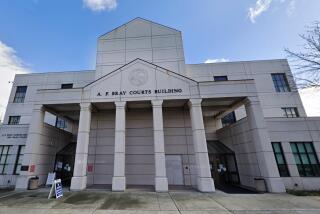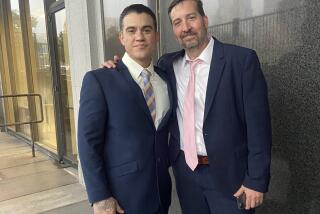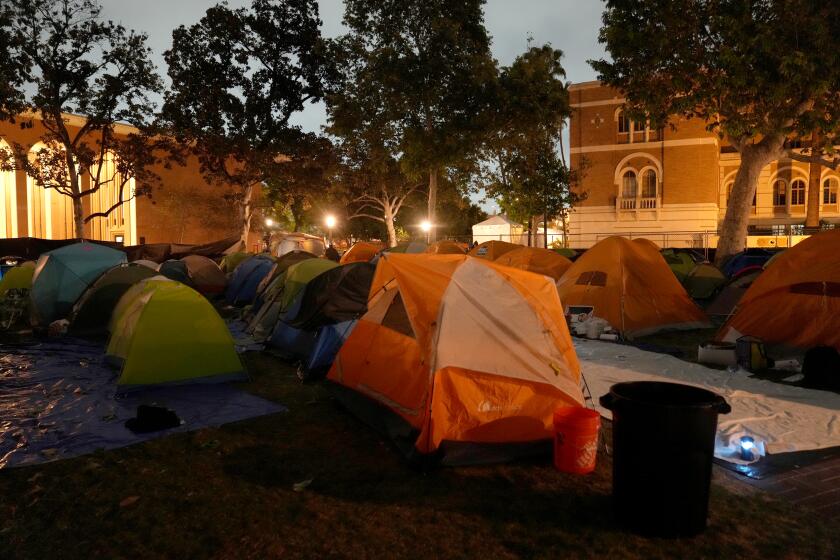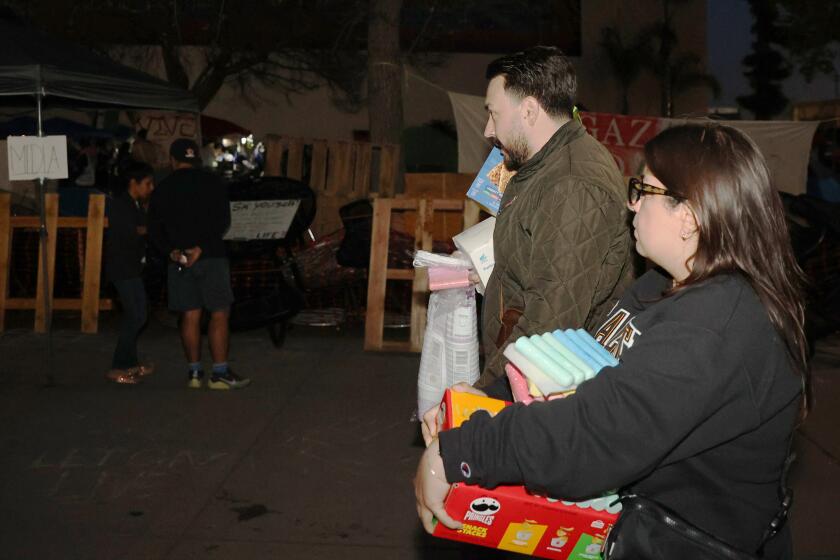After a man convicted of murdering a woman goes free, questions linger over why he was charged in first place
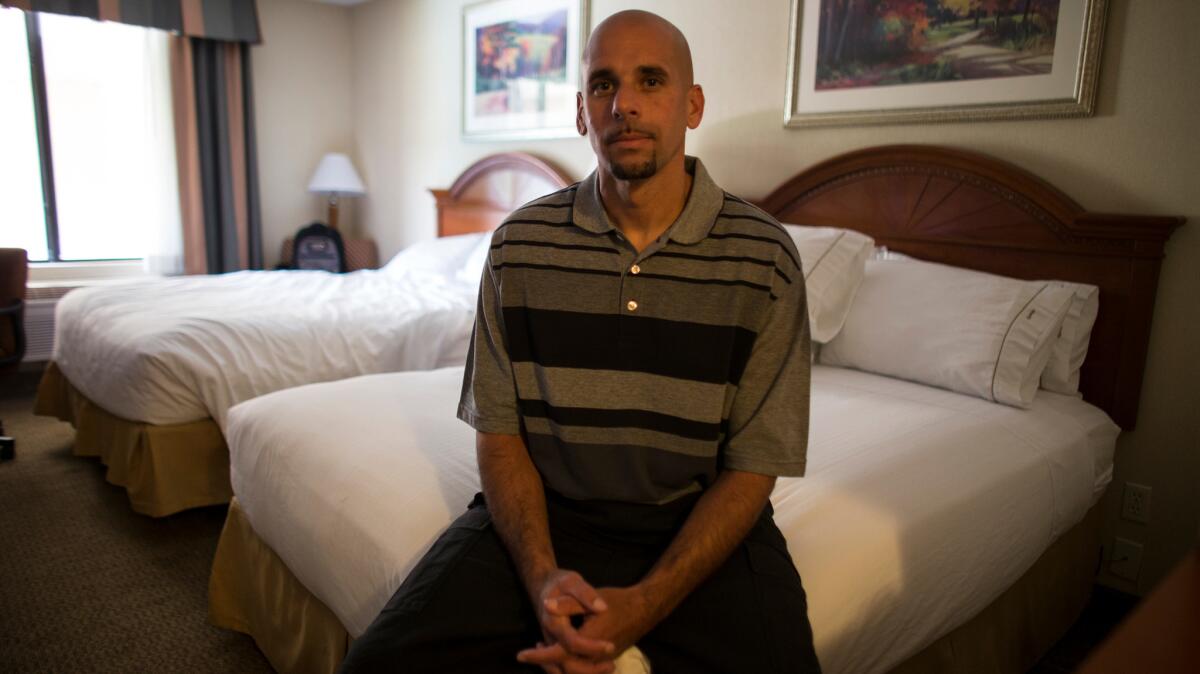
Raymond Lee Jennings wrote a desperate letter from prison.
It was the spring of 2010 — a few months into his 40-years-to-life murder sentence — and he was writing to tell a judge the same thing he’d been saying for years: “I am innocent.”
Jennings begged the civil court judge to drop the proceedings in a wrongful death lawsuit filed against him by the family of the teenager he was convicted of killing. In a six-page letter filed with the court, he lambasted homicide detectives who helped put him behind bars, but reserved some of the strongest language for an unlikely character: a local attorney.
“This entire case,” Jennings wrote, “is built upon the false accusations proclaimed by civil attorney and mayor of Lancaster California, R. Rex Parris … Parris has abused his power.”
Jennings spent 11 years behind bars for the slaying of 18-year-old Michelle O’Keefe, who was shot and killed in a Palmdale parking lot in February 2000. But he was set free recently at the request of prosecutors, who said they had discovered evidence that not only cast doubt on his guilt but showed that someone else could be responsible.
Jennings’ release has renewed focus on the role Parris, well-known attorney and powerful political figure in the Antelope Valley, played in the original case.
Jennings and his lawyers have long questioned Parris’ influence on the prosecution, saying he propelled a rush to judgment that ultimately led to his being charged and then convicted.
But prosecutors have said they were influenced only by the evidence in the case, not by the lawyer. Parris, who has served as mayor of Lancaster since 2008, said he believes his role in the prosecution was negligible.
A Times review of Los Angeles County court and Sheriff’s Department records shows that the attorney got involved early on, as the homicide investigation stalled and the family grew desperate for answers.
Months after the killing, Parris filed the civil suit on behalf of O’Keefe’s family against Jennings, the security guard on duty in the parking lot the night of the slaying. Testy sworn interviews Parris conducted with Jennings were used in the murder trial Los Angeles prosecutors ultimately brought against him.
Well before the murder charge was filed, Parris spoke to then-Dist. Atty. Steve Cooley about the case, and Cooley directed the head of his major crimes division to talk to Parris, according to the sheriff’s records. But major crimes prosecutors never pursued a criminal charge.
The case was eventually reassigned to the district attorney’s Antelope Valley office, where the head prosecutor at the time filed a murder charge against Jennings in 2005. Parris’ firm had previously defended that prosecutor in a drunk driving case. The prosecutor said he never spoke to Parris about the case.
Legal experts said Parris’ level of involvement was unusual for a civil attorney in a homicide case but that advocating for a prosecution is not improper.
Parris said his singular goal was to get justice for Michelle O’Keefe, adding that once he had what he believed to be mounting evidence of Jennings’ guilt, he considered it his duty to take action.
“If I could’ve got a meeting with President Bush to get this guy prosecuted, I would’ve,” he said in a recent interview with The Times.
Parris said he believed his lobbying efforts and connections had little, if any, effect and that he was surprised when prosecutors did finally charge Jennings.
“If Mr. Jennings is innocent, I’m sorry,” Parris said. “But I haven’t seen that he is yet.”
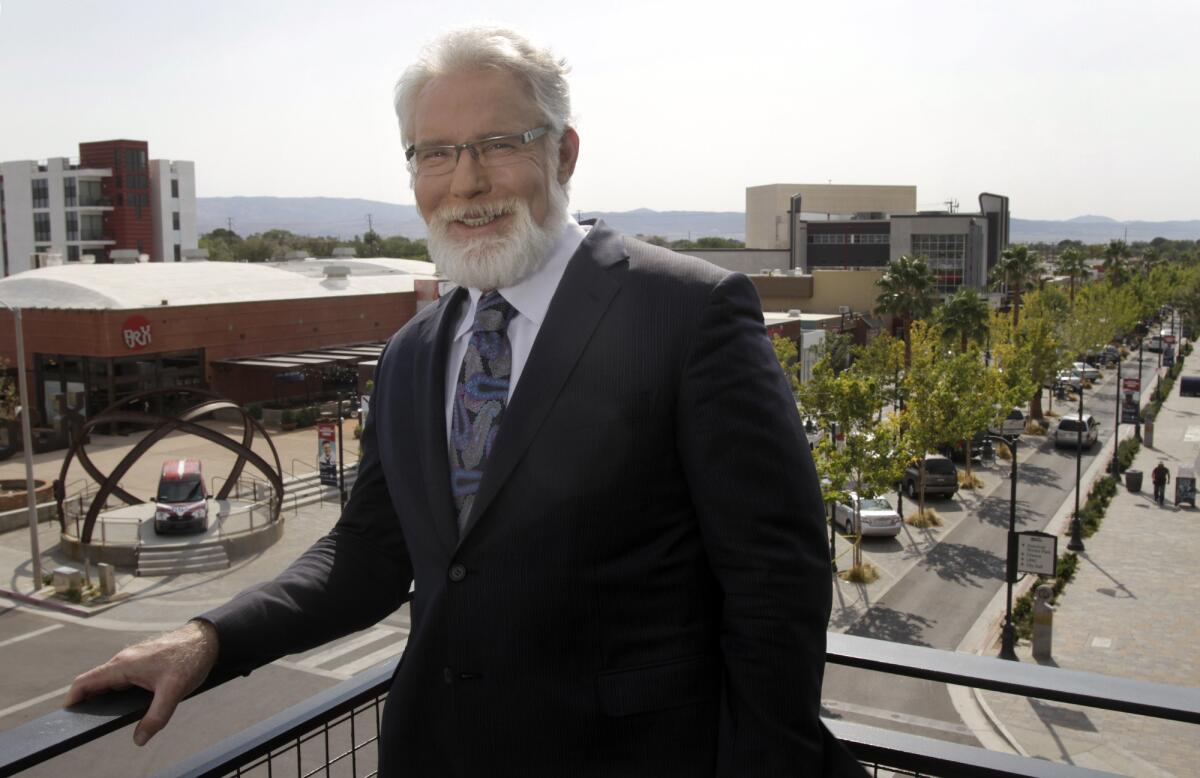
Parris’ face, framed by a thick white beard, stares out from bus advertisements and billboards across the Antelope Valley. The legal heavyweight specializes in class-action, personal injury and malpractice cases.
When the O’Keefe family went to Parris asking for help with a lawsuit, Parris said he initially considered it a straightforward negligence case against the city of Palmdale focused on the lack of security cameras in the parking lot.
But Parris said he slowly grew suspicious of Jennings — he recalled thinking the security guard had too much information for someone who wasn’t the killer — and the attorney was eager to crack the case.
He said he put $90,000 toward investigative costs, as well as offering a $50,000 reward for the gun used in the shooting. It was never found.
Court records show that after a request from Parris, the Sheriff’s Department gave him, as well as the other attorneys in the civil case, access to some evidence, including video interviews of Jennings, even though the homicide investigation was ongoing. Later, the department refused to provide Parris with additional documents.
Sheriff’s detectives had quickly zeroed in on Jennings, noting inconsistencies in the accounts he gave them in several interviews about the night of the shooting. Initially, he said no one else had been in the parking lot. Later, after prompting, he recalled another car leaving soon after the shooting. The time that he said he heard the first shot also shifted by several minutes each time he spoke to investigators. And he knew details about the killing that detectives had never shared publicly, including that only one gun was used.
Parris’ investigators scoured Jennings’ history and the attorney sent him a request demanding he turn over any reports written about the night of O’Keefe’s death, the murder weapon and other items. In response, Jennings invoked his Fifth Amendment right against self-incrimination, which stoked Parris’ suspicion.
The attorney asked Jennings to come to his office for an interview.
During the contentious August 2002 deposition — the first of two — Parris asked bluntly, “Did you murder Michelle O’Keefe?”
“No,” Jennings responded, “I did not.”
The security guard repeatedly claimed his innocence and often struck a defiant tone. He spoke at one point of an attorney who he believed was “trying to pin this murder on me.” Parris asked Jennings who he was talking about.
“That would be you, Mr. Parris,” he responded.
After the depositions, Parris said he remembers feeling confident Jennings was guilty.
Although Jennings told investigators that he’d seen O’Keefe’s hand twitch — something some experts said showed he’d been nearby right after the killing — during the deposition he said he wasn’t sure if he’d seen a twitch. Parris said he believed the shifting story line was telling.
Parris said the way Jennings interacted with O’Keefe’s parents, who attended the depositions, also convinced him of the security guard’s guilt. During a court hearing, Parris said he planned to solve the killing during the civil trial.
“Yes, we do believe there’s a substantial probability that Mr. Jennings murdered Miss O’Keefe,” Parris said at the hearing. “He sexually assaulted her and then he murdered her.”
In late 2002, Parris told one of the homicide detectives on the O’Keefe case that he had spoken to Cooley, who was then the district attorney, about the killing, according to sheriff’s records. In a recent interview, Parris said he didn’t recall talking to Cooley about the case, adding, “But that’s not to say it couldn’t have happened.” Parris and his wife have donated thousands of dollars to Cooley’s political campaigns in recent years.
Asked about the conversation recently, Cooley said, “I may well have spoken to Rex. I have no recollection of that,” adding that he considers Parris a longtime friend. Cooley said, however, that he had a hands-off role in the case and did nothing to move it along within the office.
“There is no real smoking gun here in terms of Rex talking to me,” he said. “A lot of people talk to me.”
In August 2003, the head of the district attorney’s major crimes division told a sheriff’s homicide detective that Cooley had ordered him to talk to Parris about the O’Keefe killing, according to the sheriff’s records. The records do not detail the nature of the conversation.
After the case was moved to the Antelope Valley office, Robert Foltz, the office’s supervisor, decided in February 2005 against filing charges, citing a lack of evidence. In December of that year, Foltz changed course, filing a murder charge against Jennings. The prosecution’s theory was similar to the one Parris had publicly argued — that Jennings killed O’Keefe when she rebuffed his sexual advance in the parking lot.
Court records show that Parris’ firm represented Foltz on a 2000 drunk driving charge and that Parris appeared in court for one hearing. But Foltz said it was Parris’ brother and another attorney in the office who did the rest of the legal work, saying Parris was “much too important” to handle the case personally.
Foltz, who has retired from the district attorney’s office, said the DUI case had no impact on his decision to prosecute Jennings. He told The Times that Jennings’ depositions in the civil case were a key reason he decided there was enough to bring a murder charge but he never spoke to Parris about the case.
“I wouldn’t have contact with him … because I thought it was inappropriate,” he said.
Jennings’ appellate attorney, Jeffrey Ehrlich, said he was shocked when he learned about Parris’ connection to Foltz.
“It looks terrible, it smells terrible,” he said. “A decision whether to file a murder case should be based on the state of the evidence, not on any prior relationship, not on a political connection or on a civil lawsuit.”
Asked if he believed his firm’s representation had any impact on Foltz’s decision, Parris said, “I do not. Unequivocally, do not.”
The district attorney’s office declined to comment on Foltz. But the office said the prosecutor who took the case to trial, Michael Blake, “created a professional distance with the Parris firm” because Parris could have been called to testify about Jennings’ “repeated inconsistent statements and odd demeanor” during the depositions in the lawsuit. In the end, Parris did not testify.
Legal experts said they saw nothing wrong with a civil attorney lobbying for criminal charges as long as prosecutors based their decision on evidence.
“People of influence talk to the DA all the time, and that’s not per se a problem,” said Loyola Law School professor Gary Williams.
In the lawsuit brought by Parris, the city of Palmdale reached a $400,000 settlement with the O’Keefe family and the complaint against Jennings was eventually dismissed. Jennings was in custody at that point, Parris said, and “all that could be accomplished had been.”
Despite Jennings’ recent release from custody, which marked the first big move by a new district attorney’s unit dedicated to overturning wrongful convictions, Parris said he still believes Jennings is probably guilty.
“I think, if he’s innocent, he just lied his way into a jail cell for reasons that are really quite inexplicable,” Parris said, adding that 32 of the 36 jurors who heard Jennings’ case during three trials believed him guilty and that a panel of appellate justices upheld the conviction in 2011.
Jennings’ appellate attorney said his client may have said things that were inconsistent, but he didn’t tell lies.
“Those were normal frailties of a human being,” Ehrlich said. “They convicted a witness to the murder instead of a murderer, and he lost 11 years of his life.”
No physical evidence ever linked Jennings to the crime.
Although the murder case hasn’t been dismissed, a judge ordered Jennings’ release from state prison in late June, after receiving a request from prosecutors who said “credible new evidence” casts doubt on Jennings’ guilt.
The district attorney’s office hasn’t publicly named another suspect or detailed the evidence, but Ehrlich said there is proof showing that prosecutors and investigators knew there were other people at the crime scene the night of the killing, but focused solely on Jennings.
At the June court hearing, the judge ordered Jennings to avoid contact with a few people. Among them was Parris.
For more criminal justice news from Los Angeles, follow us on Twitter: @lacrimes and @marisagerber.
ALSO
New clues emerge in a cold-case killing possibly linked to Manson family murders
After a summer of deaths and arrests at rave concerts, solutions are hard to find
After mass shooting, San Bernardino endures a surge in deadly violence: 150 shootings, 47 slayings
More to Read
Start your day right
Sign up for Essential California for news, features and recommendations from the L.A. Times and beyond in your inbox six days a week.
You may occasionally receive promotional content from the Los Angeles Times.
